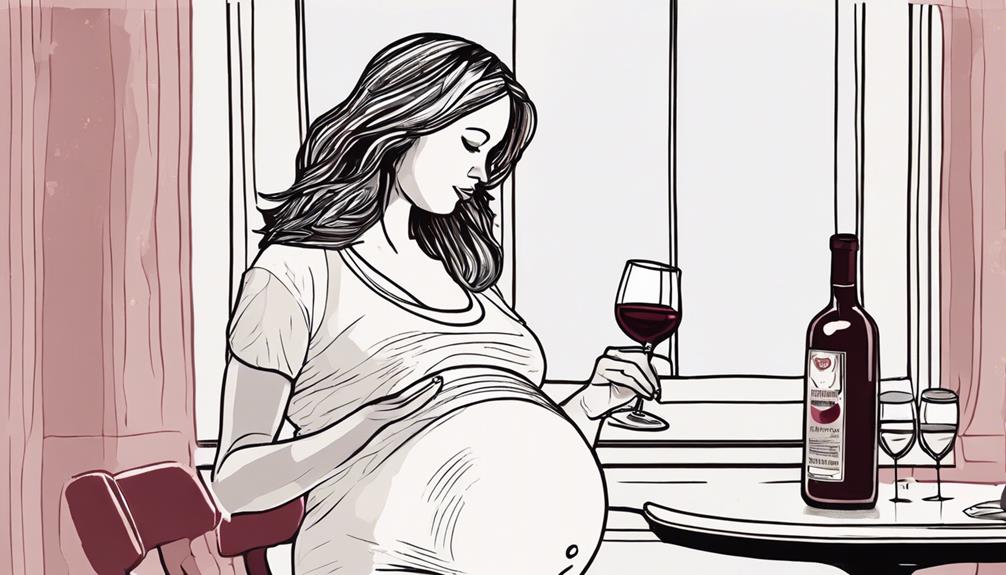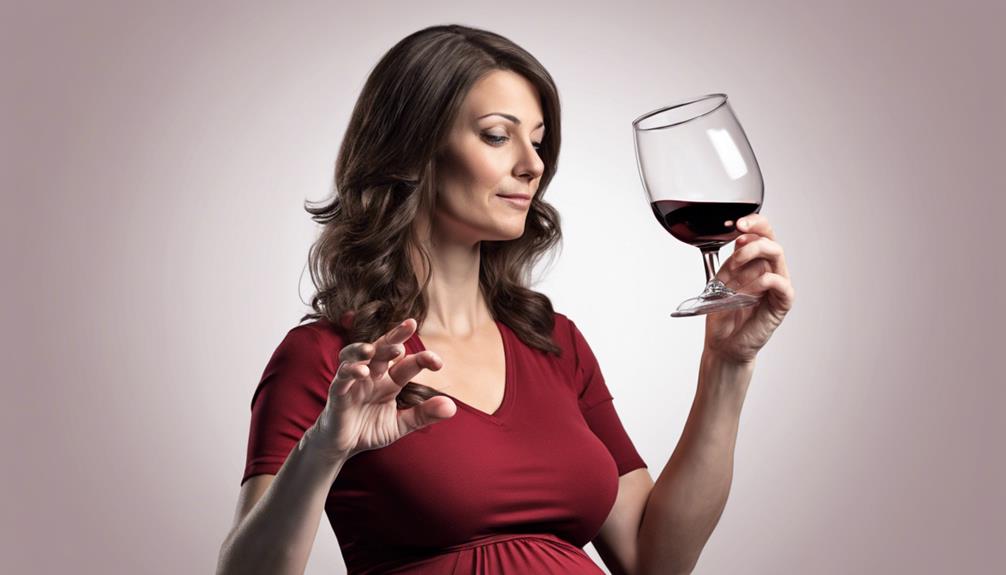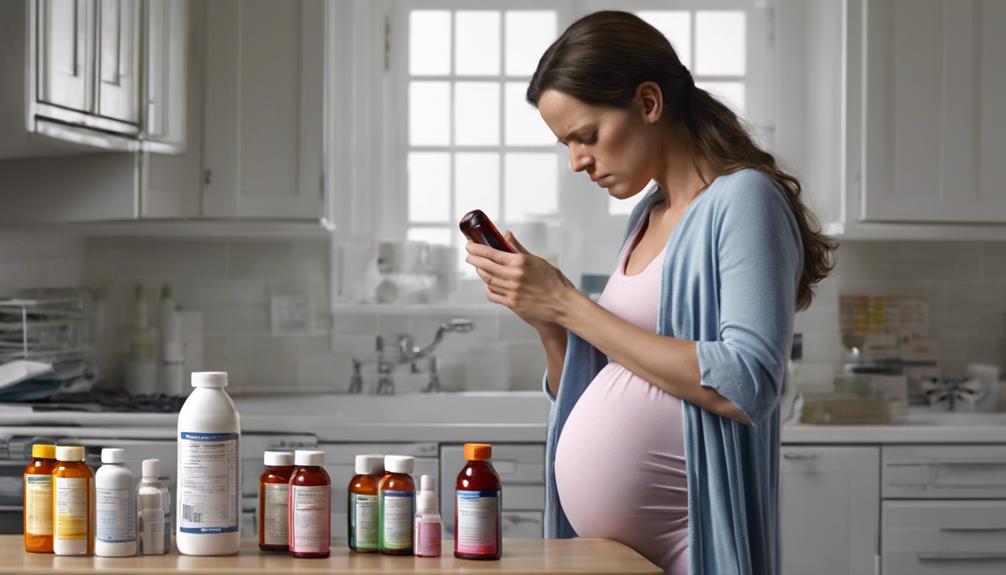The traditional saying states that you cannot both keep your cake and eat it too. The debate over consuming alcohol during pregnancy continues to be a highly disputed topic, especially when it comes to savoring an occasional glass of wine in the second trimester.
While some may argue for moderation, our understanding of the potential risks involved continues to evolve. Before making any decisions, it’s essential to grasp the full scope of information available.
So, what exactly does having one glass of wine while pregnant in the second trimester entail, and what are the implications for the baby’s well-being?
Key Takeaways
- Drinking one glass of wine in the second trimester poses serious risks to the baby’s development.
- No safe level of alcohol consumption during pregnancy has been identified, including in the second trimester.
- Fetal alcohol syndrome and birth defects can result from even a small amount of wine during pregnancy.
- Prioritizing complete alcohol avoidance throughout pregnancy is crucial for the well-being of the baby.

Saint Viviana Non-Alcoholic Cabernet Sauvignon, Non Alcoholic Red Wine, Gluten Free, Low Sugar, Zero Proof, California Dealcoholized Wine, Blackberry, Plum, Coffee & Vanilla Notes, 24.6 fl oz Bottle
DEALCOHOLIZED WINE: We gently de-alcoholize our wine at low temperatures to maintain the distinct properties of the grapes…
As an affiliate, we earn on qualifying purchases.
As an affiliate, we earn on qualifying purchases.
Risks of Drinking Wine During Pregnancy
Drinking wine during pregnancy, even in small amounts, presents significant risks to the health and development of the unborn baby. Alcohol consumption during pregnancy, especially in the second trimester, can lead to fetal alcohol syndrome, causing various birth defects.

It’s essential to heed medical advice that strongly recommends avoiding alcohol entirely during pregnancy as even one glass of wine can have detrimental effects. The dangers lie in the fact that alcohol easily passes through the placenta to the baby’s bloodstream, directly impacting their growth and well-being.
Medical authorities emphasize that there’s no identified safe amount of alcohol consumption during pregnancy, making it imperative for expectant mothers to steer clear of alcoholic beverages to safeguard the health of their unborn child.
To prevent potential harm and complications, it’s best to err on the side of caution and completely abstain from drinking wine or any other alcoholic beverages while pregnant.

Earth Mama Organic Peaceful™ Tea | Stress Less! Calming, Relaxing Herbal Blend Safe for Pregnancy & Beyond, 16 Teabags Per Box
USDA CERTIFIED 100% ORGANIC: Organic Peaceful Tea is a must-have for anyone who needs to chill: pregnant ladies,…
As an affiliate, we earn on qualifying purchases.
As an affiliate, we earn on qualifying purchases.
Guidelines for Drinking Wine While Pregnant

To safeguard the well-being of the unborn child, it’s vital to adhere strictly to the recommended guidelines regarding wine consumption during pregnancy. Women who are pregnant should be aware that medical authorities strongly advise against drinking any amount of wine during this critical time.
Even consuming just one glass of wine during the second trimester can pose serious risks to the health of the baby, potentially leading to conditions such as fetal alcohol syndrome. The American College of Obstetricians and Gynecologists stresses the importance of complete alcohol avoidance throughout pregnancy to prevent any harm to the developing fetus.
Pregnant women need to prioritize their health and the well-being of their baby by choosing to abstain from drinking wine entirely during this period. By following these guidelines and abstaining from wine consumption, pregnant women can help assure a healthier outcome for both themselves and their babies.

Nature Made Prenatal Vitamins for Women with Folic Acid + DHA, Prenatal Vitamin and Mineral Supplement for Daily Nutritional Support, 110 Softgels, 110 Day Supply
Now with orange scent: Adults take one pre natal multivitamin for women daily with water and a meal…
As an affiliate, we earn on qualifying purchases.
As an affiliate, we earn on qualifying purchases.
Effects of Wine on Baby Development
When considering the effects of wine on baby development during pregnancy, the potential risks that even one glass of wine can pose include:
- Alcohol Risks: Consuming wine, even in small amounts, can lead to serious risks for the baby’s development. The alcohol in wine can cross the placenta, affecting fetal growth and potentially causing neurological issues.
- Fetal Alcohol Syndrome: One glass of wine during pregnancy can contribute to the risk of fetal alcohol syndrome and related disorders. These conditions can have long-lasting effects on the baby’s health and well-being.
- Placental Transfer: Through placental transfer, the alcohol from wine can directly impact the baby’s developing organs and brain. This process underscores the importance of avoiding alcohol consumption during pregnancy to safeguard the baby’s development.
Pregnant women need to understand the significant impact that even one glass of wine can have on their baby’s growth and well-being. To prioritize the health of the baby, it’s advisable to abstain from alcohol entirely throughout pregnancy.

ChongErfei Maternity Belt, Pregnancy 3 in 1 Support Belt for Back/Pelvic/Hip Pain, Maternity Band Belly Support for Pregnancy Belly Support Band (L: Fit Ab 39.5"-51.3", Black)
✅RECOMMENDED BY OBSTETRICIANS: Medical studies show wearing a high quality maternity support belt, helps to promote a healthier…
As an affiliate, we earn on qualifying purchases.
As an affiliate, we earn on qualifying purchases.
Recommendations for Pregnant Women

Pregnant women are strongly advised by medical experts to completely avoid consuming alcohol, including wine, throughout their pregnancy to safeguard the health and development of their baby. Even the consumption of one glass of wine during the second trimester can pose significant risks to the baby’s development.
Fetal alcohol syndrome and other birth defects can occur when alcohol passes through the placenta to the baby, impacting their growth and well-being. Medical authorities, such as the American College of Obstetricians and Gynecologists, emphasize that no safe amount of alcohol consumption has been identified during pregnancy.
As a result, pregnant women need to abstain from alcohol entirely to protect the health of their babies. By choosing to avoid alcohol, expecting mothers can reduce the risk of potential harm and give their babies the best chance at a healthy start in life.

Let’s prioritize our baby’s well-being and opt to abstain from alcohol during pregnancy to protect their health.
Common Misconceptions About Alcohol in Pregnancy
Despite the prevalent misconceptions surrounding alcohol consumption during pregnancy, it’s essential to understand that even one glass of wine can pose serious risks to the health of the developing baby. When it comes to alcohol consumption in pregnancy, there are common myths that need to be debunked:
- Drinking Habits: Some may believe that occasional or light drinking is harmless during pregnancy, but any amount of alcohol can potentially harm the baby’s development.
- Risk of Miscarriage: There’s a misconception that only heavy drinking poses a risk of miscarriage. However, even small amounts of alcohol can increase the chances of pregnancy loss.
- Health Effects: People often underestimate the impact of prenatal alcohol exposure on the baby’s health. The reality is that alcohol can cause a range of issues, including Alcohol Spectrum Disorders and other birth defects.
It’s important to listen to what doctors say, prioritize public health guidelines, and avoid alcohol entirely during pregnancy to safeguard the well-being of the unborn child.
Frequently Asked Questions
Can I Have a Glass of Wine in My Second Trimester?
We strongly advise against having any alcohol during pregnancy, including in the second trimester. Even one glass of wine can harm the baby’s development. It’s safest to avoid alcohol completely for a healthy pregnancy.
What Happens if I Drank a Glass of Wine and Didnt Know I Was Pregnant?
If you unknowingly drank wine while pregnant, it’s important to seek medical advice promptly. Though scary, it’s vital to stay calm and trust healthcare professionals to guide you through any necessary steps to safeguard your baby’s health.
How Does Alcohol Affect a Baby in the Second Trimester?
Alcohol in the second trimester can harm a baby’s development, impacting organs and brain growth. Even one glass of wine can cause lifelong issues. We must avoid alcohol entirely during pregnancy to protect our baby’s health.

Can One Drink Cause Fetal Alcohol Syndrome?
Yes, one drink can cause fetal alcohol syndrome. It’s important to understand that even a single glass of wine during pregnancy, specifically in the second trimester, can greatly increase the risk of harming the baby’s health.
Conclusion
Ultimately, pregnant women need to avoid drinking wine and other types of alcohol to protect their baby’s health. Even one glass of wine in the second trimester can have harmful effects on the developing fetus.
According to the Centers for Disease Control and Prevention, approximately 1 in 10 pregnant women report drinking alcohol in the past 30 days, highlighting the need for increased awareness and adherence to medical recommendations for a safe and healthy pregnancy.









